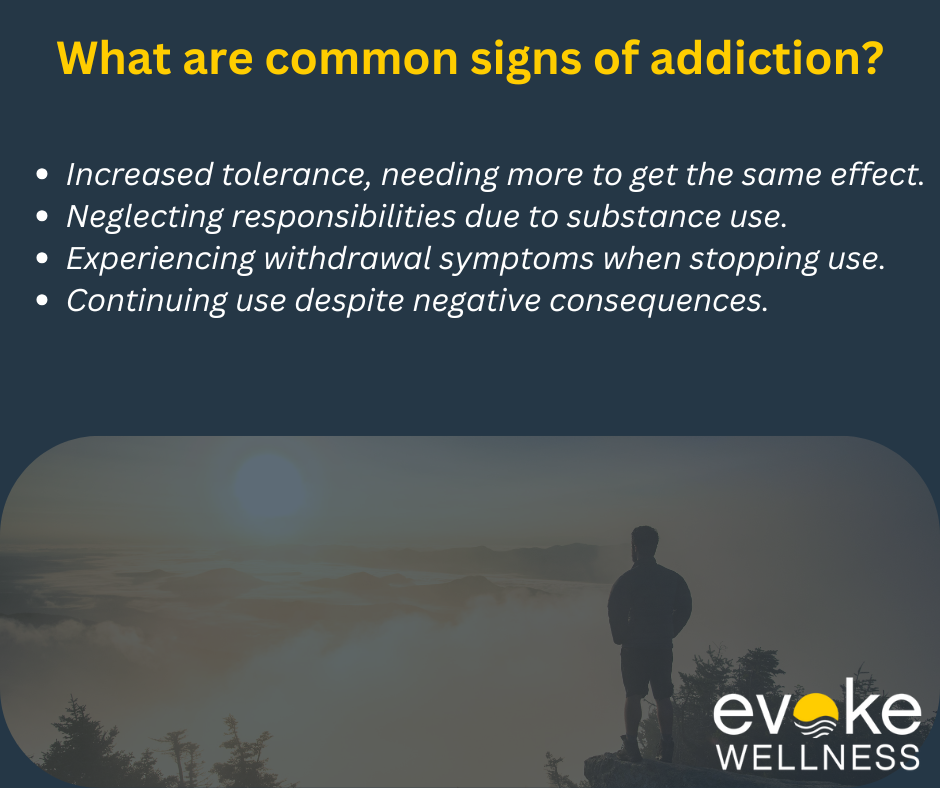Have you ever wondered if you or someone you care about might be developing an addiction? Spotting the warning signs early can make all the difference in getting help before the problem spirals out of control. In this article, you’ll learn how to identify the subtle red flags that often precede full-blown addiction. We’ll explore common behavioral changes, physical symptoms, and emotional shifts to watch out for. You’ll also discover an overview of effective treatment options available, from therapy and support groups to medication-assisted programs. By arming yourself with this knowledge, you’ll be better equipped to recognize addiction in its early stages and take action.
Call us at (866)429-2960 today or reach out online.
What are the early signs of addiction?
Behavioral Changes
One of the earliest indicators is a shift in behavior. You may find yourself lying about your substance use, stealing to fund your habit, or neglecting responsibilities at work or home. Mood swings, aggression, and secretive behavior can also signal an emerging issue.
Physical Symptoms
Addiction takes a toll on the body. Early physical signs include bloodshot eyes, frequent nosebleeds, shakes, and dramatic weight fluctuations. Lack of grooming and general disregard for physical appearance are common as well.
Dependence
As addiction develops, you’ll need increasing amounts of the substance to feel its effects. Inability to cut back or quit entirely – even temporarily – points to physical and psychological dependence. Experiencing withdrawal symptoms like nausea, sweating, and anxiety when trying to stop is a major red flag.
Psychological signs of addiction
Obsessive Thoughts
One major psychological sign is obsessive thoughts about the addictive substance or behavior. You constantly crave it and find yourself preoccupied with thoughts of obtaining or engaging in it.
Mood Changes
Mood swings, irritability, anxiety, and depression often accompany addiction. You may feel on edge, restless, or emotionally dysregulated when unable to satiate your cravings.
Denial or Rationalization
Denial of the problem or rationalizing the addictive behavior as harmless is common. You make excuses to continue the addiction despite negative consequences.
Physical signs of addiction
Visible Changes
You may notice physical changes like weight fluctuations, bloodshot eyes, or poor hygiene. Their appearance suffers from addiction’s effects.
Bodily Symptoms
Addiction often brings headaches, nausea, tremors, and other unexplained symptoms. Pay attention to recurring physical complaints.
Sleep Issues
Disrupted sleep patterns are common. They may stay up for days or sleep excessively after a binge. Insomnia could signal addiction.
Behavioral signs of addiction
Obsessive Thinking
- Constantly thinking about the addictive substance or behavior. It consumes your thoughts.
- Making plans to obtain or engage in the addictive substance/behavior.
Loss of Control
- Using more of the substance than intended. Inability to cut back or quit.
- Engaging in the addictive behavior more frequently or for longer periods.
Neglecting Responsibilities
- Abandoning work, school, or home obligations due to substance use or addictive behavior.
- Letting hygiene, appearance, and other self-care habits deteriorate.
Relationship Issues
- Lying to loved ones about substance use or addictive behaviors.
- Pulling away from family and friends to spend more time obtaining/using substances.
Risk-Taking
- Engaging in risky situations while under the influence.
- Continuing the addictive behavior despite negative consequences.
Recognizing these warning signs early can motivate seeking help and exploring treatment options before addiction takes a stronger hold.
What causes addiction? Overview of risk factors
Biological Factors
Some people may have a genetic predisposition that impacts their brain’s reward circuitry. Making them more vulnerable to addictive substances or behaviors. Certain mental health conditions also increase addiction risks.
Environmental Influences
Your surroundings play a major role. Peer pressure, stress, trauma, and even parental guidance during childhood shape addictive tendencies. Access and exposure to addictive substances is another trigger.
Personal Circumstances
Underlying issues like loneliness, low self-esteem, impulsivity or poor coping mechanisms make some individuals prone to addictions. Major life transitions or traumatic events can be gateways too.
The key is recognizing these risk factors early. This awareness empowers you to get help and avoid spiraling into full-blown addiction. With the right treatment and support, recovery is absolutely possible.
Getting help for addiction
Seeking professional help is crucial for overcoming addiction. The path to recovery begins with acknowledging the problem and reaching out for support.
Explore Treatment Options
- Inpatient rehab programs provide 24/7 care and support in a residential facility.
- Outpatient programs allow you to attend therapy sessions while living at home.
- Support groups offer a safe space to share experiences and find encouragement.
Build a Support System
Surrounding yourself with understanding loved ones can make a significant difference. Inform them about your situation and let them be part of your journey.
Embrace a Lifestyle Change
Recovery is an ongoing process that requires commitment and lifestyle adjustments. Be prepared to develop healthy coping mechanisms and make positive choices daily.
Addiction treatment options
Seek Professional Help
- Talk to your doctor or counselor about treatment plans tailored to your needs. Trained professionals can guide you towards evidence-based therapies and support.
Explore Therapy Options
- Cognitive-behavioral therapy (CBT) helps modify harmful behaviors and thoughts related to addiction. Family therapy and support groups also aid recovery.
Consider Medication
- Certain medications can ease withdrawal symptoms and cravings, increasing your chances of overcoming addiction when combined with counseling.
Embrace Lifestyle Changes
- Making positive lifestyle adjustments like improving sleep, nutrition, exercise and stress management supports lasting sobriety. Avoid triggers and high-risk situations.
The path to recovery involves commitment, but know that you have options and support available. With perseverance and the right treatment plan, overcoming addiction is achievable.
FAQ on signs of addiction
What are common signs of addiction?
- Increased tolerance, needing more to get the same effect.
- Neglecting responsibilities due to substance use.
- Experiencing withdrawal symptoms when stopping use.
- Continuing use despite negative consequences.
How can I recognize psychological addiction?
Psychological addiction involves intense cravings and compulsive behaviors. Signs include obsessing about the substance, inability to cut back, and using it to cope with emotions or stress.
What about physical dependence?
With physical dependence, the body adapts to the substance. This can lead to tolerance and withdrawal symptoms like nausea, sweating, or tremors when not using. Medical detox helps manage these safely.
Conclusion
As you’ve learned, recognizing the early signs of addiction is crucial for timely intervention. By staying vigilant and aware, you can identify potential problems in yourself or loved ones before they spiral out of control. Remember, addiction is a complex disease, but recovery is possible with the right support and treatment.
Key takeaways:
- Watch for behavioral and physical changes
- Don’t ignore warning signs
- Seek professional help early
Treatment options:
- Inpatient rehabilitation
- Outpatient counseling
- Support groups
- Medication-assisted treatment
By educating yourself and taking action, you’re already taking the first step towards a healthier future. Don’t hesitate to reach out for help – your journey to recovery starts now.
Begin Your Journey with Evoke Wellness
If you or a loved one is considering treatment, Evoke Wellness invites you to contact us. Our compassionate team is ready to answer your questions, discuss your needs, and help you take the first steps toward recovery. At Evoke Wellness, you will find more than just a treatment program – you’ll discover a community dedicated to your wellness and success. Together, let’s embrace the journey to recovery and the promise of a new beginning. Call us at (866)429-2960 today or reach out online.



